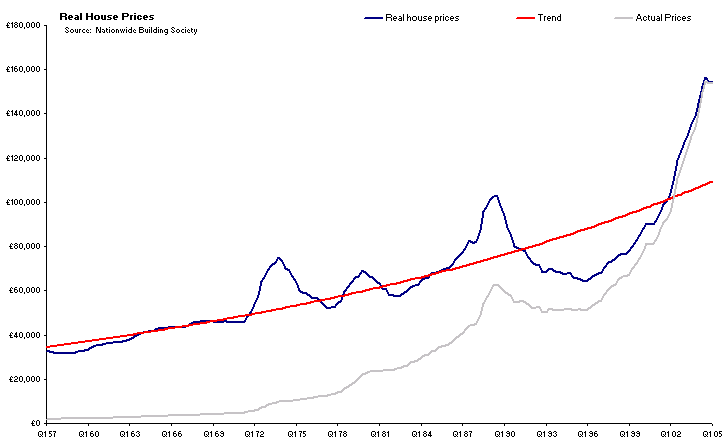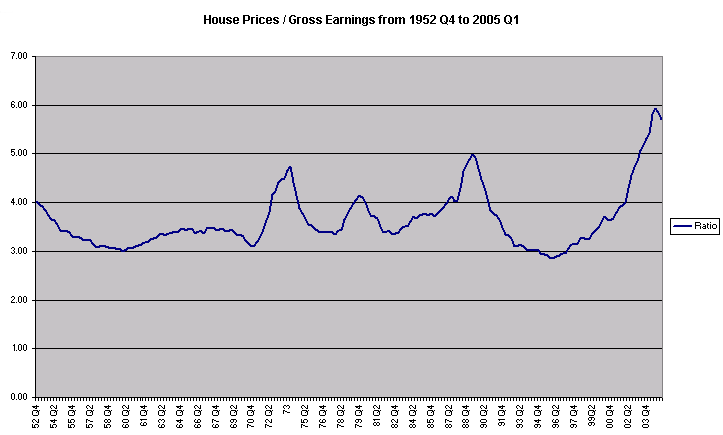

Updated 4 April 2009
 MASTER
INDEX of articles written, posted
online, or recommended by Alex Paterson
MASTER
INDEX of articles written, posted
online, or recommended by Alex Paterson
Below is an article written in 2005 by a consumer group in the United Kingdom (UK) called 'First Time Buyer Help' regarding the parlous state of the UK real estate market as of 2005. Although specific to United Kingdom real estate, the points raised in the article apply to most of the rest of the world. Given that the predictions voiced in the article have come to pass as of 2008 I have elected to mount the article on my website as the original URL is now defunct.
For an update on the situation in 2009 see the following article by Robert Winnet of the UK Telegraph:
House prices 'could fall by further 55 per cent' by Robert Winnett (Telegraph UK)
Quote:
"House prices may fall by a further 55 percent and there is a very
real probability that Britain will be bankrupted, a leading investment
bank has warned in a private note to clients."
Original URL: http://www.firsttimebuyerhelp.co.uk/articles/article.aspx?id=3 (now defunct)
Author: Webmaster 2005
The short answer is because property is very overvalued at present,
and prices are overdue for a large correction (or “crash” as it is
often said). This means that, should you buy now, you are at a
significant risk of negative equity.
Various estimates have been made about the extent of the over valuation
(and there are local variations, of course). Some property "experts"
think that property is not over-valued at all, and think that property
prices will carry on rising. Others, such as Roger Bootle of Capital
Economics thinks that property is overvalued by 20%.
We would estimate property is on average 40% overvalued, and the market
requires a drop of that amount to bring the level of First Time Buyers
back to their historical average.
In simple terms, this means that the average house currently on the
market for £100,000 should only be worth approximately £60,000 if
long-term and established house price trends are observed. If any First
Time Buyer were to take out a mortgage now at current price levels, it
is not an exaggeration to say that in the event of a crash, you would
most certainly regret the decision for a long time to come.
We are currently in the biggest house price bubble in recorded history
– a phenomenon that incidentally is worldwide and is not just unique to
the U.K.
To explain why you should not buy now, you have to look at what exactly
has happened to the property market in the last 5 years. The property
boom of the last 5 years has brought us to a situation where house
prices have never been more expensive in real terms than they are
today. So, if you compare house prices to other goods and services in
everyday life such as milk or bread, By “real terms”, it is meant that
the relative price of a house compared to the average things we buy
every day such as bread or milk has never been higher.
The graph below (source: Nationwide) demonstrates this effectively.

In the above graph, you can see that the whole market has seen swings and troughs since the 1970s. The last property bubble and subsequent bust of the late 80's early 1990s can be seen quite markedly. But it's hard to take your eyes away from where we are today.... today's prices adjusted for inflation are terrifying. The blue line (prices adjusted for inflation) is currently way higher than the red line (the long term trend).
And as you can see, the market
stagnation of the last year is represented by the small blip at the
end. Given what you can see from past patterns on this graph, it
surely doesn't take too much to realise what is going to happen
next. Just because house prices have doubled in value over the
last five years, does NOT mean they will double again.
But that is
exactly what Vested Interests would like you to believe. The
whole market can't move unless houses are priced at a level where
people can buy them. Interest rates will not be moving downwards
any further, and as can be seen the ratio of earnings to house prices
is even more pronounced than the last bubble :-

The above graph shows Gross Earnings related to house prices. Because earnings have not risen at anywhere near the rate house prices have been rising, then the amount we have to spend on houses related to our incomes has never been higher.
© 2005 First Time Buyer Help.co.uk
ABOUT ALEX PATERSON ![]()
Alex PATERSON is an Australian citizen by birth. He writes articles and
advises on issues pertaining to aviation, politics, sociology, the
environment, sustainable farming and forestry, history, computers,
natural health therapies and spirituality.
He can be contacted at:
![]()
![]()
Photograph of Alex Paterson ![]()